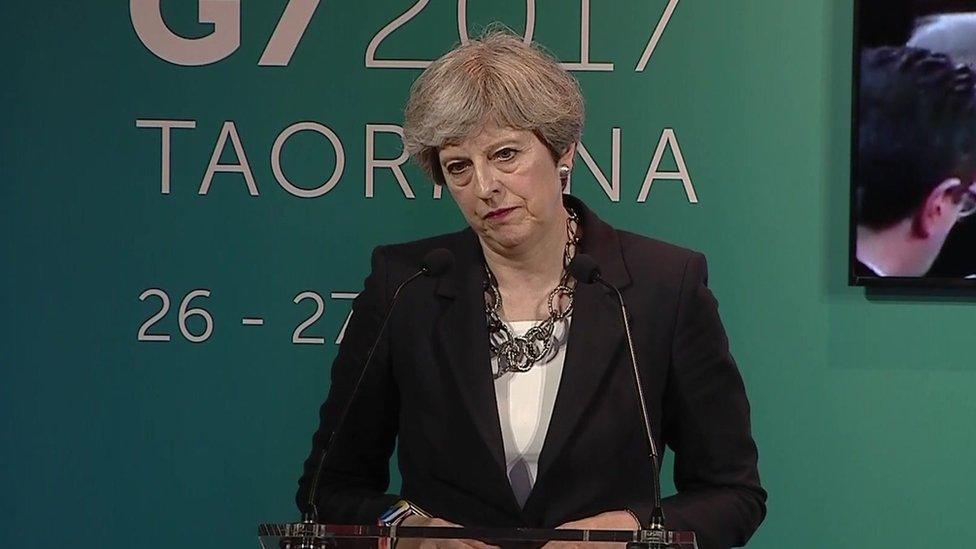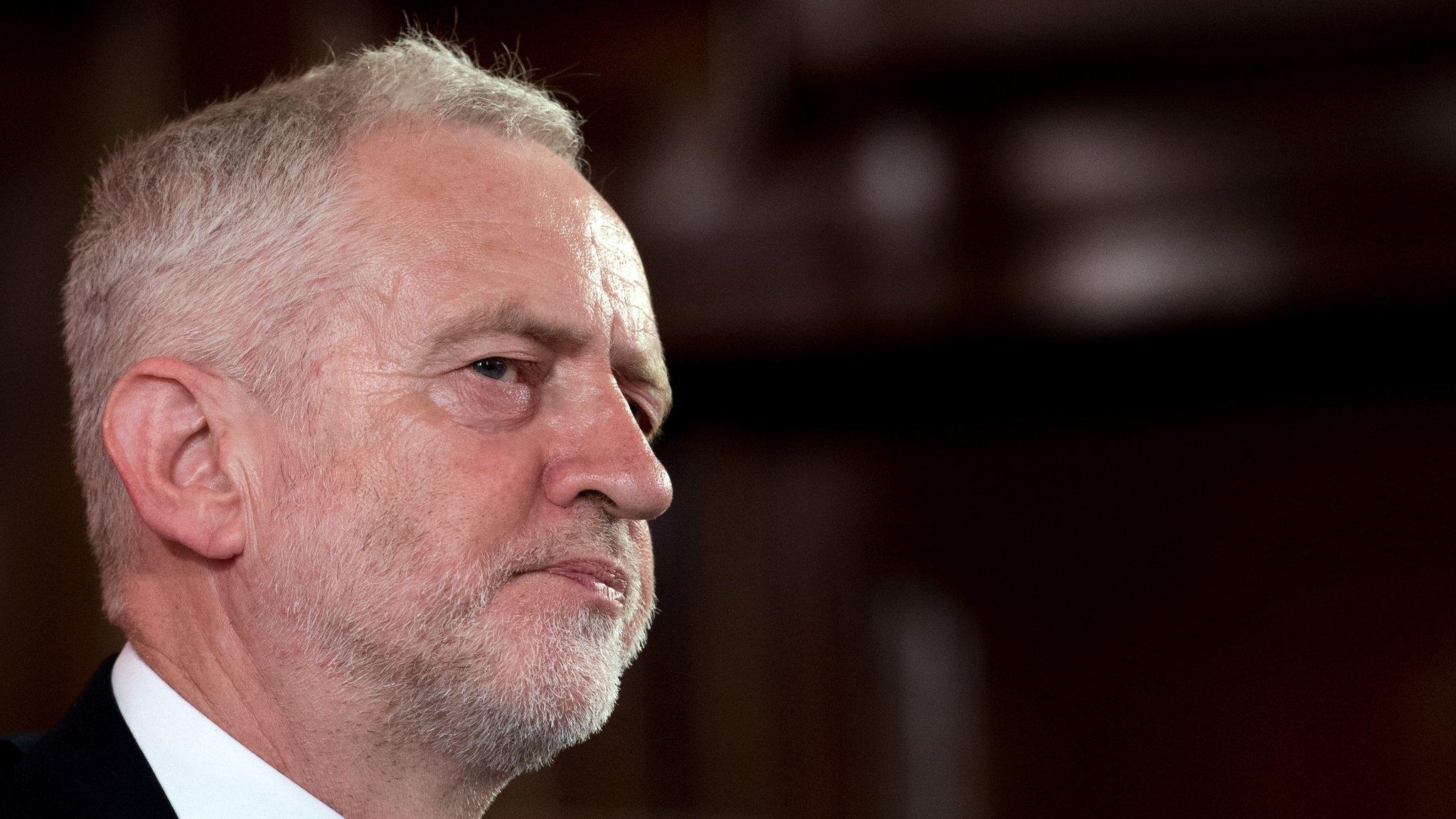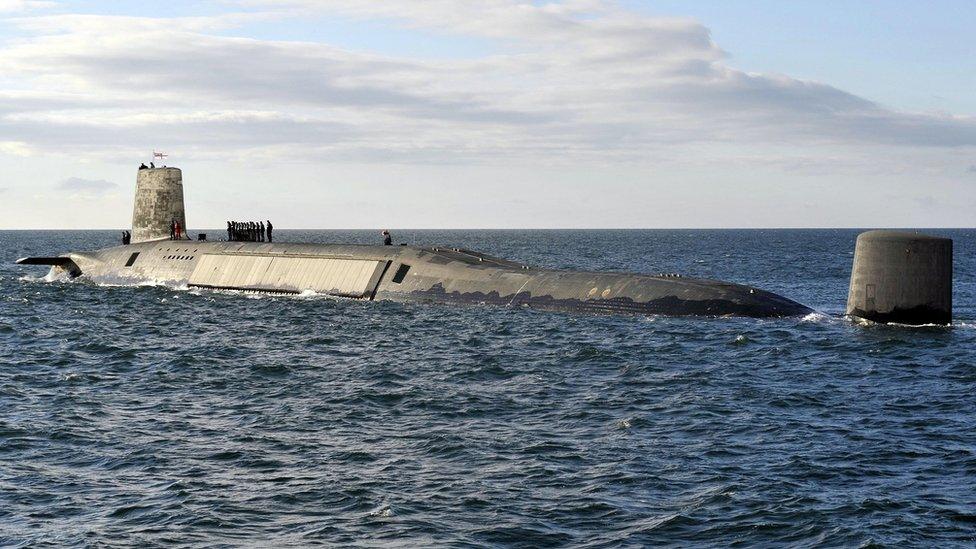General election 2017: Corbyn quizzed on Trident and IRA
- Published
Does Jeremy Corbyn back his own party's Trident stance?
Jeremy Corbyn has refused to give his personal support for the renewal of Trident nuclear weapons, despite it being in Labour's manifesto.
The Labour leader said Trident renewal would go ahead because MPs had voted for it and the Labour Party backed it.
But he told the BBC's Andrew Neil that nuclear weapons would be included in a defence review if Labour won power.
He also insisted he has never supported the IRA, after being questioned about past meetings with Sinn Fein leaders.
Asked if he urged the Irish republican paramilitary group to stop their bombing campaign, Mr Corbyn replied: "I never met the IRA.
"I obviously did meet people from Sinn Fein, as indeed I met people from other organisations, and I always made the point that there had to be a dialogue and a peace process."
Asked if he supported the armed struggle for a united Ireland, and whether he was now distancing himself from that position because he wanted to be prime minister, Mr Corbyn said "No. What I want is peace.
"What I want is to learn the lessons from Northern Ireland and also to make sure during the Brexit negotiations we don't return to or receive any kind of hard border between the North and the Republic."

Theresa May has accused Mr Corbyn of saying terror attacks are UK's fault
On Trident nuclear weapons, he said: "I voted against the renewal, everybody knows that, because I wanted to go in a different direction. That decision has been taken, I respect that decision."
He added: "It's there in the programme, it's there in the manifesto, it will be carried out... it's the position we are adopting as a party and we will take into government."
But he said that if Labour won power, there would be a defence review which would "look at the role of nuclear weapons".
"I want to achieve a nuclear-free world through multilateral disarmament, through the Nuclear Non-Proliferation Treaty," he told Andrew Neil.
'No excuse'
Earlier on Friday, the Labour leader said in a speech that he would change UK foreign policy if elected to one that "reduces rather than increases the threat" to the country.
He said "many experts" had linked UK involvement in wars abroad to terrorism at home. He also pledged to reverse police spending cuts - but stressed the blame for attacks lies with the terrorists.
Opponents criticised his speech, which came days after the Manchester Arena attack that killed 22 people.
Speaking at the G7 Summit in Sicily, Theresa May said: "Jeremy Corbyn has said that terror attacks in Britain are our own fault.
"And he's chosen to do that just a few days after one of the worst terrorist atrocities we have experienced in the United Kingdom."
She added: "There can never be an excuse for terrorism. There can never be an excuse for what happened in Manchester."
She said voters faced a choice "between me working strongly to protect the national interest and Jeremy Corbyn who, frankly, isn't up to the job".
'Different view'
Foreign Secretary Boris Johnson said it was "absolutely monstrous" that the Labour leader had attempted to "justify" or legitimise the actions of terrorists.
And Lib Dem Leader Tim Farron accused Mr Corbyn of using the "grotesque" attack in Manchester to "make a political point".
Andy Burnham, Labour mayor of Greater Manchester, also said he had a "different view" to Mr Corbyn on the issue.
"[There's] a tendency to blame governments for everything, and I don't think we should," he told Talk Radio., external
"Actions of governments can contribute, but let's remember 9/11 happened before interventions anywhere."
MPs backed the renewal of Trident in 2016, by 472 votes to 117, approving the manufacture of four replacement submarines.
Labour was split over the issue, with 140 of its 230 MPs going against their leader and backing the motion in a free vote.
Last week, Mr Corbyn stressed that Labour was "committed" to renewing Trident after a dispute between two of his frontbenchers over whether it would be reviewed if Labour won power.


- Published26 May 2017

- Published20 May 2017
